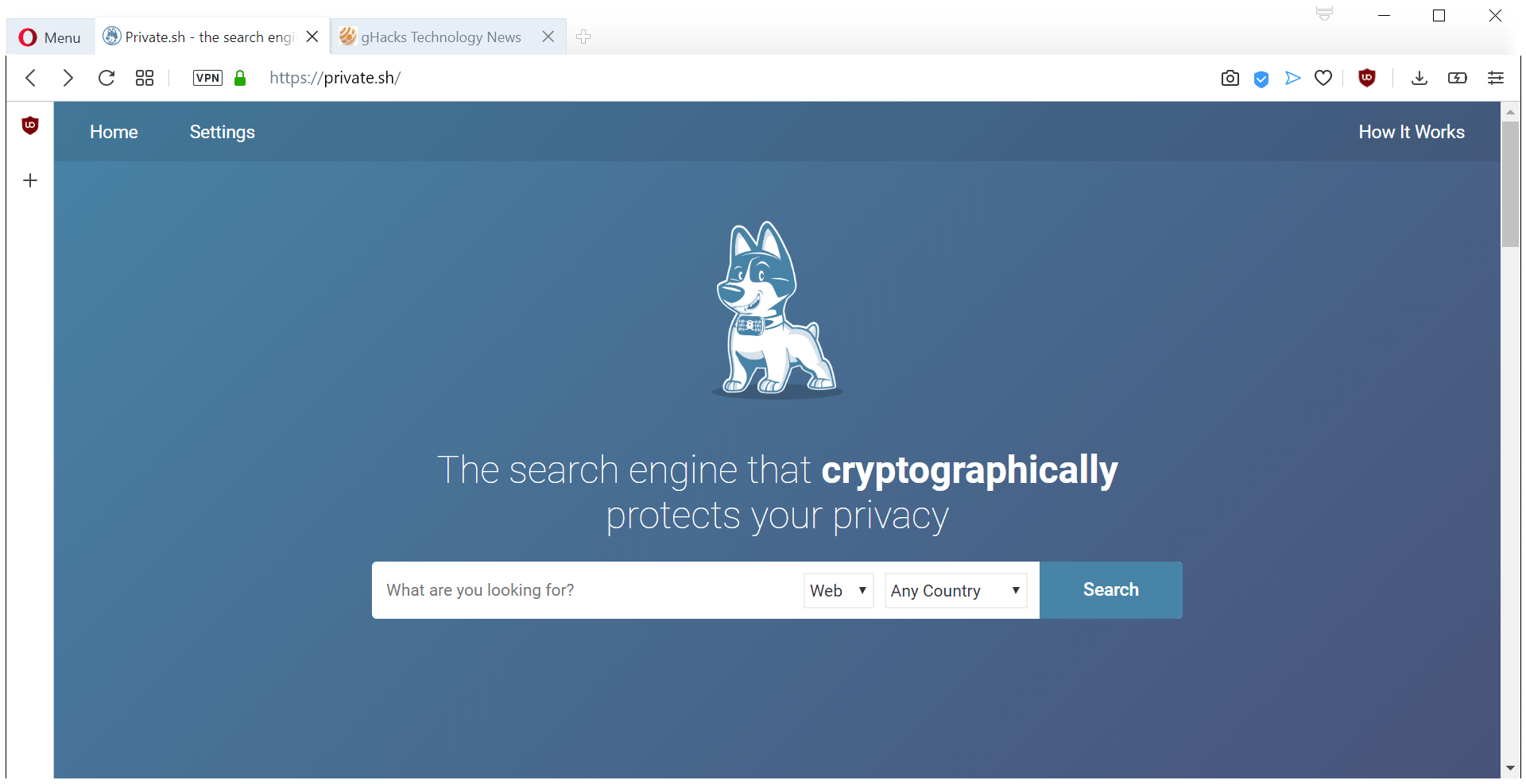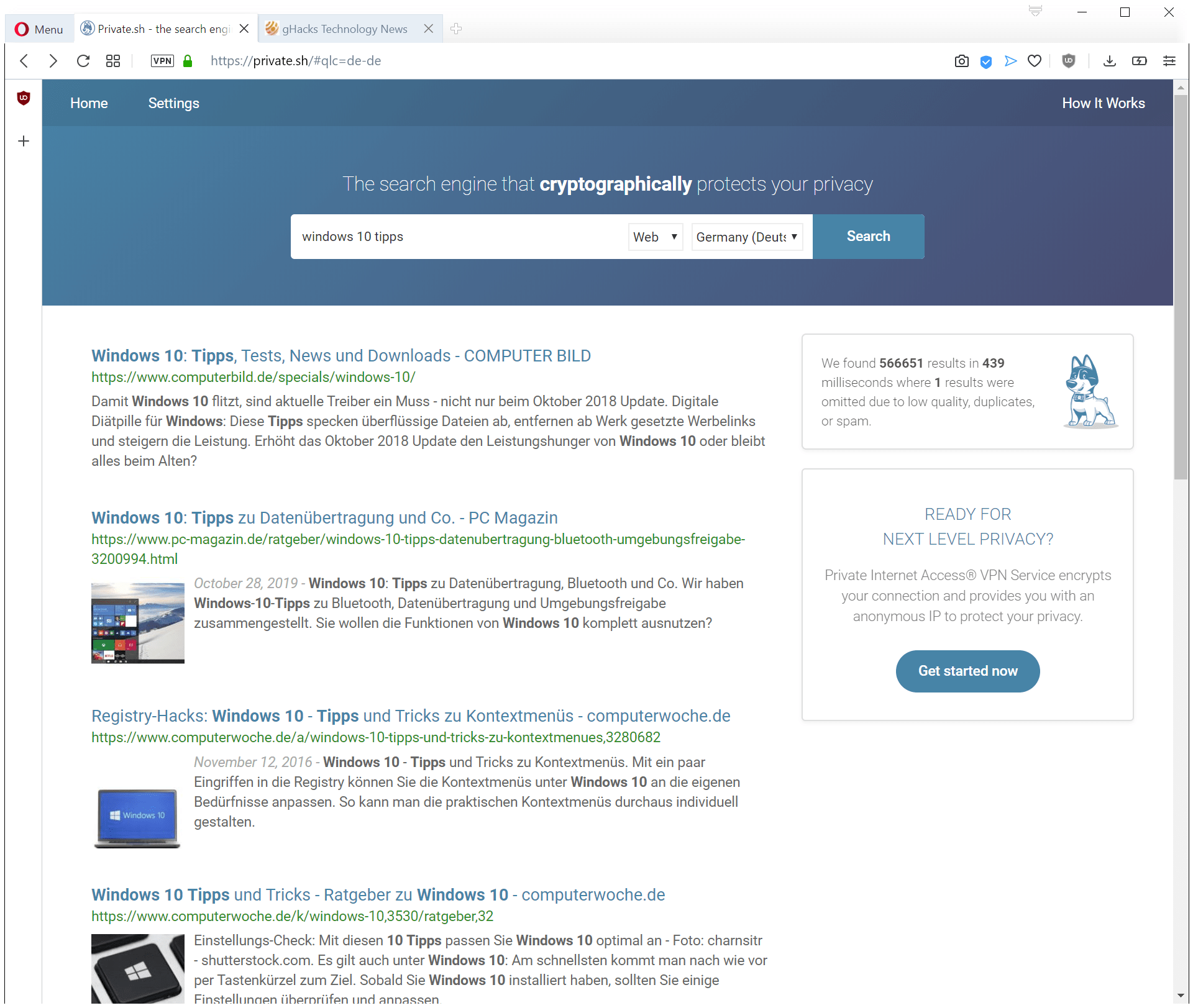Private.sh is a new search engine that was officially unveiled in November 2019. The search engine is maintained by Private Internet Access, a provider of VPN solutions and other tools, and Gigablast, a company that maintains an index of Internet pages.
Private.sh promises better privacy than other search solutions by encrypting searches on the user's system and by using secure proxies to hide user IP addresses.

The search term is encrypted automatically when users type search terms into the search field on the private.sh website and hit the search button. The request is then tunneled through a secure proxy maintained by Private Internet Access and submitted to Gigablast.
There, it is processed, encrypted using a temporary key, and send back the same way it came.
The announcement of the new service on the Private Internet Access website provides additional information on how this works:
When you enter a search term into Private.sh, the search term gets encrypted on the client side (on your computer or device) using GigaBlast’s public key, which only they can decrypt. In effect, this ensures that Private.sh never sees the search term.
After the search term is encrypted, it is passed to the GigaBlast search engine through a Private.sh proxy so GigaBlast doesn’t see your IP address, browser fingerprints, or anything that would allow for your privacy to be broken or a user profile to be created. This means that neither Private.sh or GigaBlast is able to build a user profile on you or store your search history.
Finally, the search results are encrypted by GigaBlast using your temporary public key and are returned to you through the Private.sh proxy. The results then get decrypted and rendered locally on your device using Javascript with a temporary private key that only exists on your device. This client-side keypair is changed for every search request.
The search engine itself provides a search field on the start page and options to filter by Web/News or by country. Not all countries are supported but several dozens are including the United States and other English speaking countries, France, Germany or Spain. Most Asian countries don't seem to be supported though.
Results were returned quickly during tests regardless of query or filter.

The search engine shows a text banner for Private Internet Access in a sidebar but has no other ads or unwanted content. A quick check of the network connections shows that it only connects to its own domain plus the subdomain search.private.sh.
Results are quite okay considering that the company that operates the search engine and the index does not have the resources at its disposal that Google or Microsoft have.
Private.sh Browser Extensions
Today, browser extensions for Google Chrome (and other Chromium-based web browsers) and Firefox were released. These are available on the official add-on stores and as standalone versions that users may download from the site directly.
The extensions add another layer of security to the search experience according to the announcement:
Using Private.sh’s extension adds an additional layer of security to your Private Search experience. When visiting our website, the code used to encrypt your search term comes from the website even though it executes client side in your browser through Javascript. When using the Private.sh Google Chrome Extension or Firefox Add-On, all the code not only runs locally on your machine. Once the Private.sh extension code is on your machine, it is all but impossible to tamper with unless an attacker has read/write access to your computer.
Closing Words
Private.sh makes a good first impression. The search engine loads quickly, results are displayed fast thanks to the bare-bones nature of the search results page's design, and results appear to be quite good as well (based on limited testing though). The promise that searches and user IPs are protected needs to be verified by a third-party though.
The search engine supports a limited number of countries and languages, and search options. It lacks media searching for one, and there are not any options to filter search results by time or extend the protection the proxy offers by letting users open results using it (like Startpage does).
All in all, not a bad start and certainly something that privacy-conscious users may want to keep an eye on.
Thank you for being a Ghacks reader. The post Private.sh Privacy Search Engine first look appeared first on gHacks Technology News.
إرسال تعليق